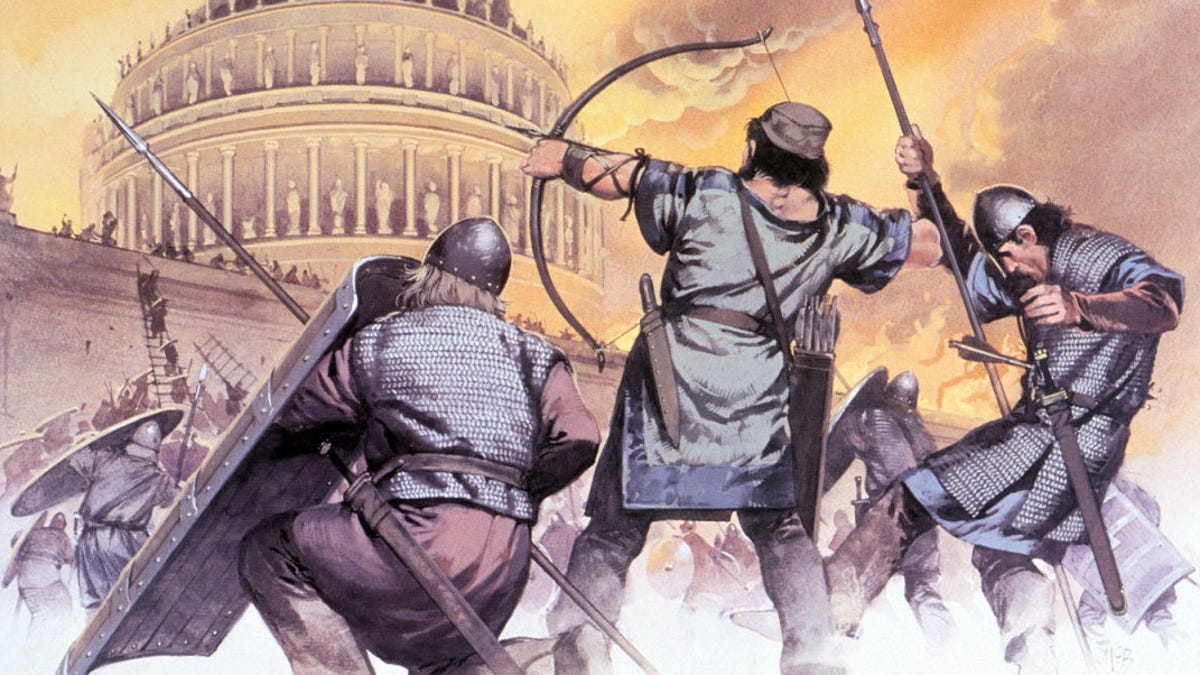 Why You Can Trust CNET
Why You Can Trust CNET Proprietary software and the fall of Rome
The barbarians are at the gates, and increasingly winning.

If you've never read Edward Gibbon's classic, The Decline and Fall of the Roman Empire, you really should. I used Gibbon heavily in my Masters thesis, The Rise and Fall of American Hegemony, and find parallels between Gibbon and modern society, including the world of software.
As Gibbon explains, it's not weakness that crippled Rome, but its strength, just as Clayton Christensen wrote many years later about how the world's most successful companies fail:
"The decline of Rome was the natural and inevitable effect of immoderate greatness. Prosperity ripened the principle of decay; the cause of the destruction multiplied with the extent of conquest; and, as soon as time or accident and removed the artificial supports, the stupendous fabric yielded to the pressure of its own weight. The story of the ruin is simple and obvious: and instead of inquiring why the Roman Empire was destroyed we should rather be surprised that it has subsisted for so long." (173-174)
Such a remarkable stroke of genius, pithily stated....
What is most shocking in Gibbon's analysis is just how quickly strength turned to rot. We're not talking about decline over tens or hundreds of years. We're talking about relatively immediate decline, though it took Rome two centuries to recognize just how dead it was.
How is this possible? Well, it's not hard to find modern-day analogs. On a trivial level, consider football (soccer) and, most recently, Chelsea Football Club. The club is in disarray as its arrogant but effective coach, Jose Mourinho, left the club earlier this week. The team lost today to Manchester United, tied no-name Rosenborg earlier in the week, and is generally in turmoil. This despite winning the Premiership two of the last three years and coming close in the Champions League for the last three years.
Chelsea is struggling precisely because of its expensive, big-ego players and its standards for success. It has taken very little to demonstrate the brittle nature of the esprit holding the team together.
Back to software. The proprietary world can crow about its ever smaller group of winners. Oracle is doing very well, as are Microsoft, IBM, etc. But you have have noticed that there are fewer and fewer such companies as the (proprietary) industry consolidates. More eggs are being placed in fewer baskets.
Meanwhile, open source software companies and communities are proliferating. In fact, I recently talked with a researcher who has found that open source development is increasing at an exponential rate (I'll blog more on this when the research is published).
So, on one hand, we have proprietary success being concentrated in fewer and fewer hands, while open source is broadening its base at a frenetic pace. That proprietary world continues to compete in the way that Christensen details, building complexity into products in order to justify hefty license and maintenance fees while "good enough" open-source solutions increasingly become "better than good enough," and earn enterprises' business.
Most proprietary vendors will tell you that they're unaffected by open source. They are. The superiority complex that fuels proprietary software vendors has some historical precedence in Rome's attitude toward the barbarians...right until the day the barbarians took over:
Rome's attitude toward its barbarian neighbors was commonly that of a belief in their own superiority. The Romans looked upon their own civil wars as grave affairs while "making light" the endemic warfare among the barbarians.
When the barbarians struck (with ample assistance from the slaves within Rome), Rome was too soft to counterattack. And so it fell. We will reach a point where the inefficient waste that is proprietary software development and distribution will hit its peak, and I'm convinced that it will topple. But, as with Rome, I believe these proprietary ecosystems will take decades to fully implode. They will subsist on maintenance revenues for many years.
And then they'll be gone, and every software company will be an open-source software company, at least to a large degree.
Why am I so confident? Because I compete with proprietary software vendors every day and it's getting harder and harder to lose to them. I'm very serious about this. It is hard to lose to proprietary software vendors if an open-source project or company is even remotely credible, because we have cost, quality, model, and distribution on our side.
I can hear a fiddle in the distance.